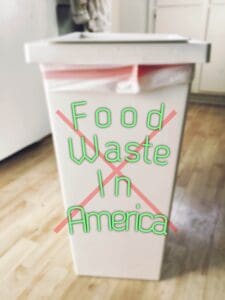Important information on food waste from your Indianapolis waste hauling company
How in the world are consumers in industrialized countries, like America, collectively wasting almost as much food as the entire net food production of sub-Saharan Africa?! As your Indianapolis waste hauling company, we think it’s so important that we educate our readers about being smart about their waste by giving insight on recycling, waste management, and types of waste. One topic we haven’t touched too much on: food waste.
When we feel too full to finish our plate of food, what do we do? We toss it in the garbage without thought. This common after-meal practice in American, along with several other wasteful habits, have resulted in a massive need for change and have caused much environmental, social, moral and financial strife.
Broken down, the average full trashcan of a typical Hoosier looks something like this:
27% Paper
14.6% Food
13.5% Yard Trimmings
12.8% Plastics
9.1% Metals
9% Rubber, Leather and Textiles
6.2% Wood
4.5% Glass
3.3% Other
As your Indy waste hauling company, we see a lot of trash, and food is no exception. As you can see, people throw away a lot of food. In fact, according to the EPA, Americans threw away nearly 35 million tons of food in 2012. To put this growing issue into perspective: that is 50 percent more than in 1990.
Americans waste several types of foods, but the most common foods are as follows: Fruits and Vegetables, Seafood, Grains, Meat, and Milk.
Why is Food Waste so Bad?
Now that you understand what food waste in America is and the extent of it, it’s important to know the top couple of reasons food waste is terrible for our world as a whole. The most seemingly obvious reason, chronic worldwide hunger, is the most serious problem. The United Nations Food and Agriculture Organization estimates that about one in nine people are suffering from chronic undernourishment in the world, which is about 805 million people.
The lesser obvious problem with food waste, and a problem that is more directly related to Greenway as an Indy waste hauling company, is the threat of food waste on the environment. Landfills that are filled with decomposing food release methane, a gas 20 times more lethal than carbon dioxide, and organic waste is the second largest contributor to American landfills (according to an article published by the Washington Post).
What can you do at home?
Food waste is an obvious problem for everyone, so what can you do about it? Here are our top 7 tips on shopping, storing and disposing of food properly to reduce the amount of food you waste. Implementing these tips can help you make smaller steps for the greater good.
1. Plan your grocery list
Don’t go to the store without creating a list first.
2. Write out reminders
If you purchase items with expiration dates, make a calendar or use your phone’s calendar to remind yourself to use the items before they go bad.
3. Stay organized
Keeping your fridge and pantry organized will help you see everything you have, and less expired food will be wasted.
4. Freeze extra foods
If you know you have or bought too much of a specific food, like produce, consider freezing the extras and using them when you need.
5. Use leftovers
If you don’t want to eat your leftovers, use them in another dish instead of simply tossing them! (ex: combine leftover chicken and vegetables into a stew or soup)
6. Donate your non-perishable foods
Take a look at your pantry foods and sort through the ones that you know you won’t eat in a timely manner. Donate the ones you don’t care for to a local food bank.
7. Compost your foods
As your local Indianapolis waste hauling company, we love hearing about successful composting in homes and businesses. We’ve written a blog featuring information about composting and other forms of waste management, click here to be re-directed!
Food waste is a serious problem, which one of these tips will you implement this week?





